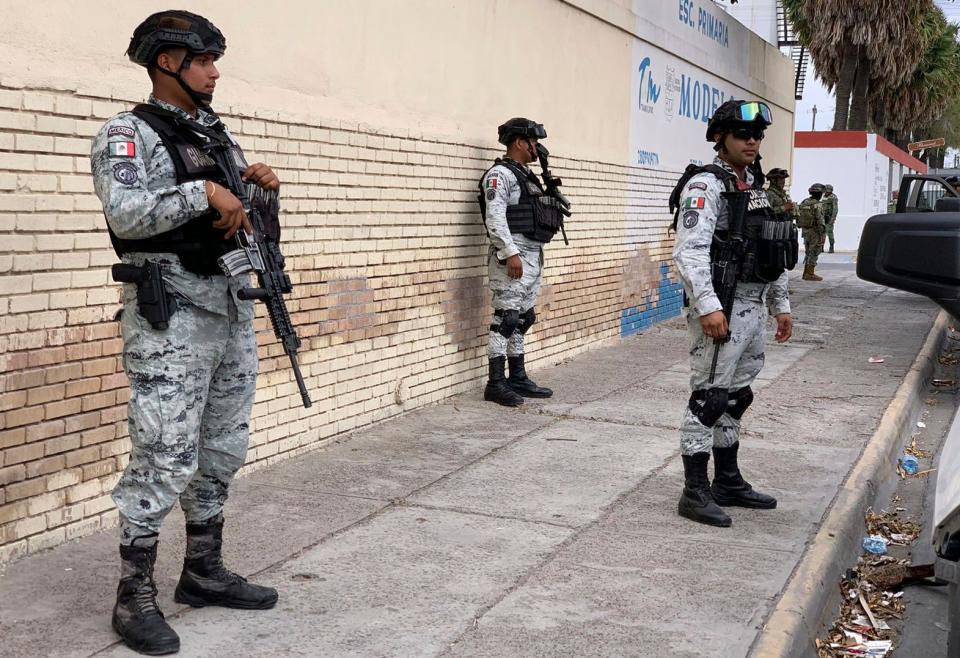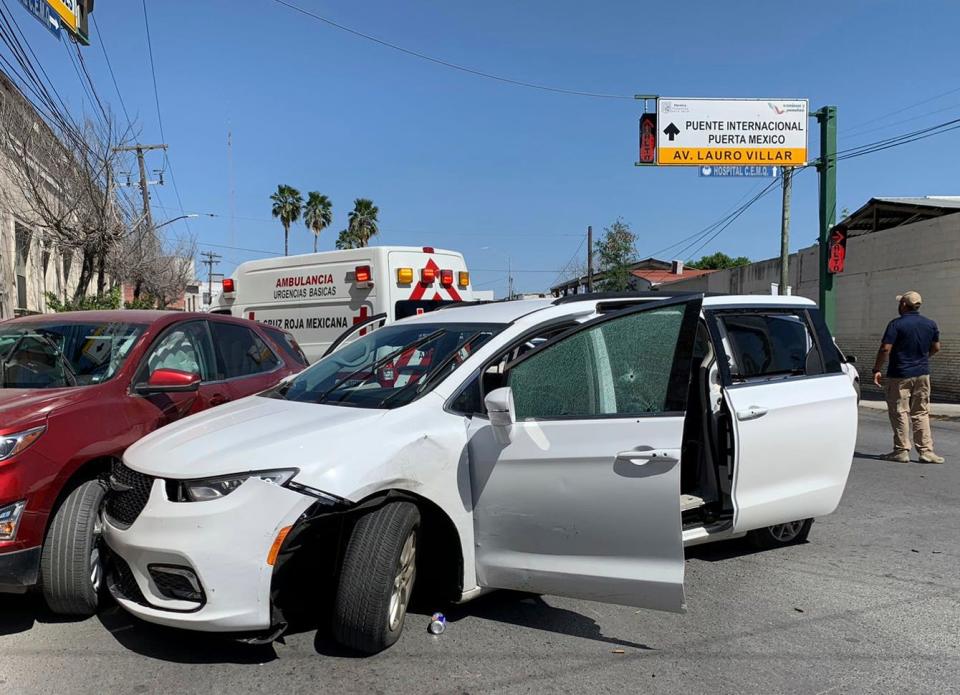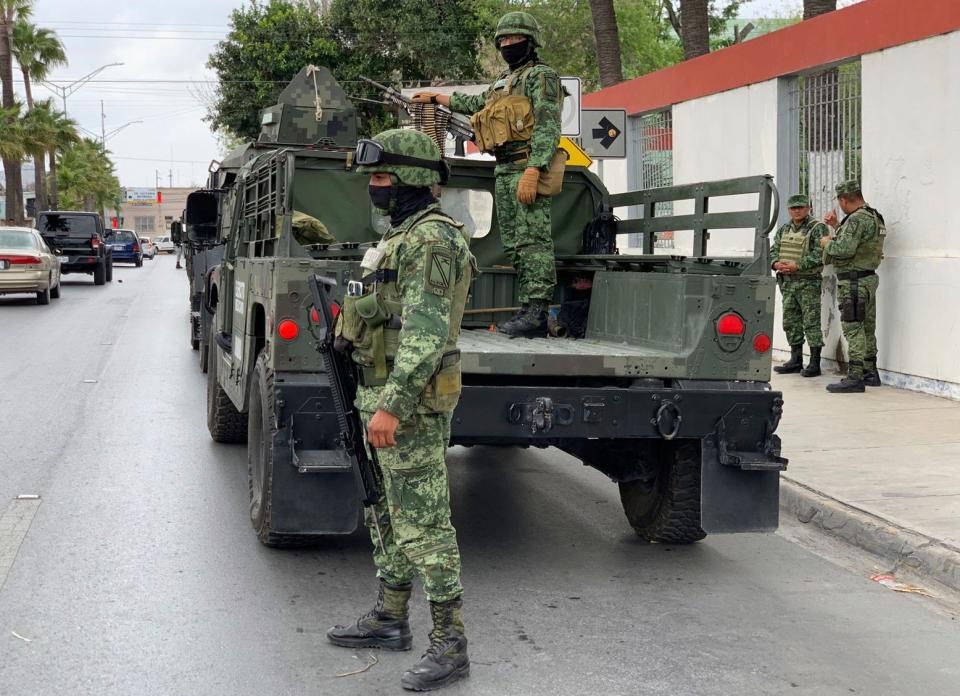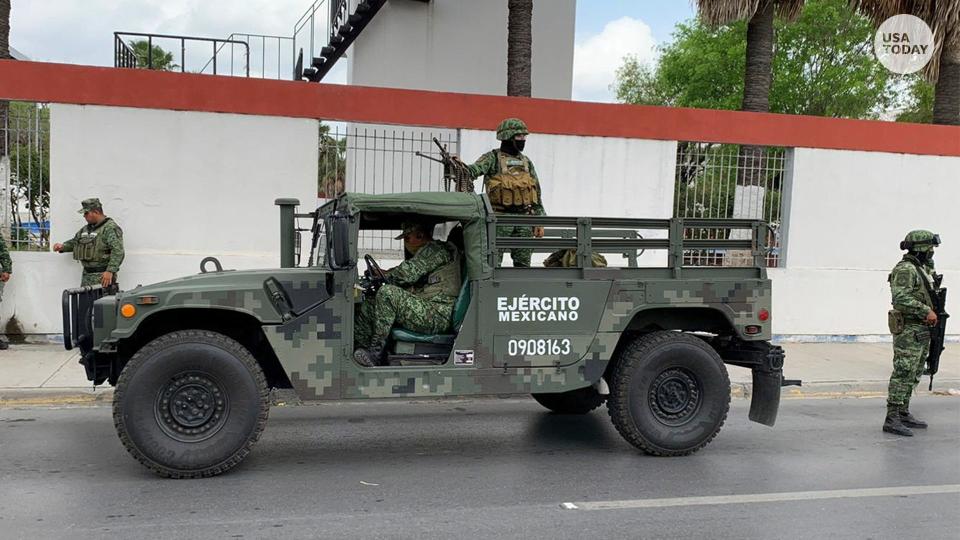With 2 Americans dead in Matamoros, a cartel-scarred Mexican border town wonders what's next
Felicia Rangel-Samponaro, an immigrant advocate who works in Matamoros, was stunned to hear about a violent attack in the Mexican border town last week.
The attack itself wasn't shocking. What surprised her were the victims: four people from the United States.
"This is a common occurrence. It happens all the time," she said as she crossed into Mexico from Brownsville, Texas, which she does each day to run a nonprofit for migrant aid.
"But it's usually aimed at asylum-seekers," she said, "not anyone else."
The attack and Tuesday's announcement that two Americans had been found and two others were dead – all of them missing since an apparently brazen daylight attack on Friday – have stunned the region despite its deep history of smuggling and cartel violence.
At the same time, the attacks highlight the way similar abductions, killings or other violence can plague the community but draw little public outcry when they involve Mexicans or migrants. And with details about the Americans' deadly venture still scarce, it was unclear how either law enforcement or regular travel could be affected by the case going forward.

Brendon Tucker lived and worked in Matamoros in 2019 helping asylum-seekers through an advocacy agency. When a cartel group disapproved of his activities, he said, he was warned twice through a third person to cease his interactions with migrants. He later left Matamoros and today works as a project manager for Global Response Medicine in Reynosa, across the border from McAllen, Texas.
To have cartel gunmen shoot and kidnap Americans without provocation seems like a departure from their modus operandi, Tucker said. More likely scenario: The cartels mistook the four Americans for other people, he said.
"I would be absolutely blown away if they were targeted on purpose," Tucker said. Cartels "are going to do everything in their power not to put their foot in the ant pile that is the United States government. ... There is no way for a cartel to have done this for it to be beneficial to them."
Federal investigators believe the group was mistakenly targeted and there was nothing to indicate they were in Mexico for any other purpose than a medical procedure, a person familiar with the investigation said. An official statement called the case only "an ongoing criminal investigation."
Zalandria Brown of Florence, South Carolina, said authorities told her her younger brother, Zindell Brown, 28, was among the four Americans in the case.
“This is like a bad dream you wish you could wake up from,” Brown told The Associated Press. “To see a member of your family thrown in the back of a truck and dragged, it is just unbelievable."
Four Americans in Mexico

Video posted to social media Friday showed men with assault rifles and tan body armor loading four people into the bed of a white pickup in broad daylight. News photos from the scene showed Mexican security forces around a white minivan with North Carolina plates.
But it was this week that the apparent identities of the people involved became clear.
Brown said the four had traveled together from South Carolina so one of them could get a tummy tuck from a doctor in Matamoros.
Mexican officials said Friday's attack and abduction happened just 2½ hours after the group crossed the border for a medical appointment.
Tamaulipas state Attorney General Irving Barrios Mojica said the victims were found Tuesday around 8 a.m. in a house outside Matamoros.
One of the surviving U.S. citizens was found wounded and the other was unharmed, Tamaulipas Gov. Américo Villarreal said after confirming two Americans died. A suspect who was standing guard over them has been arrested.
Barrios Mojica said no ransom had been demanded.
Both survivors were returned to the United States on Tuesday, in a convoy of ambulances and SUVs that was escorted by Mexican military Humvees and National Guard trucks with mounted machine guns.
Many Americans visit
The State Department lists Tamaulipas as a Level 4, Do Not Travel destination. But Americans still cross the border overland – to visit extended families that straddle or for less expensive medical care.
Charlene D’Cruz, an immigration attorney in Brownsville who works with asylum-seekers and travels frequently to Matamoros, said it's not uncommon for U.S. citizens to travel to Matamoros for medical procedures ranging from dental work to cancer treatment to cosmetic surgery and cheaper prescriptions. The treatments are often offered at a fraction of U.S. costs, she said.
One place in particular, the Centro Medico Internacional, houses doctors specializing in an array of specialties, said D'Cruz, who traveled there last year for a respiratory exam. The new case has made her and others postpone future trips, she said.
"This is brutal," D'Cruz said. "It's horrible."

For people who live on the Mexican side of the border, the situation may be different.
Advocates have been warning for years that migrants were being kidnapped, extorted and killed in north Mexican border towns such as Matamoros, Reynosa and Nueva Laredo as they waited their turn to seek asylum in the United States. But rarely did that violence extend to U.S. citizens, they said. Cartels would prefer not to draw U.S. attention to their illicit activities.
People working with migrants in Tamaulipas, though, say migrants must pay the cartel to transit the state and for permission to attempt crossings of the Rio Grande into the United States. Some say migrants in Matamoros are extorted by the cartel to be allowed free movement.
“You pay a fee, and they give you a code … and then they check your code,” said Abraham Barberi, a U.S.-citizen pastor operating a migrant shelter in Matamoros. “It’s a one-time deal.”
Kidnappings difficult to quantify
Duncan Wood, vice president of the Wilson Center, a Washington-based think tank, and senior adviser to the Mexico Institute, said cartels and criminal groups may target migrants or wealthy people but tend to avoid everyday U.S. citizens because of the attention such cases carry.
Even though Matamoros is in Tamaulipas, which the U.S. State Department says travelers should avoid because of the danger of kidnapping and other crimes, he said it was possible the Americans were mistaken for rivals or migrants.
“If they were, in fact, going over for medical tourism, which happens all the time, then generally they would have been left alone by Mexican organized crime,” he said.
Wood, who spent 17 years living in Mexico and has studied the country for nearly three decades, said he knows the pain such incidents can cause. When he was a professor, he said, several of his students were kidnapped for ransom.
The overall prevalence of kidnappings is difficult to accurately quantify, he said. Many aren’t reported including when families believe police can’t effectively investigate or kept quiet when a kidnapped wealthy executive is freed after paying a private ransom.
Along with high-profile cases, there are what's known as “express kidnappings” in Mexico, he said, when assailants hold a person in a car until they can withdraw cash from an ATM over two days before they are dropped off.
Today, partly because of clashes among rival cartels over disputed territory in Tamaulipas and criminals who prey on migrants trying to cross the border, it’s a place he avoids.
“I would not go into Matamoros,” he said. “It's just not safe.”
Wood said the abductions probably will add fuel to the combustible U.S. political debate over border security and how to address Mexican drug cartels.
Already this week, U.S. Sen. Lindsey Graham, R-S.C., called on the Biden administration to ramp up pressure on Mexican drug cartels.
Is Mexico safe overall?
Security analysts say many parts of the country are safe for tourists, such as Mexico City and major beach destinations such as Los Cabos and Cancún. But large swaths of Mexico fall under the control of cartels.

“There are many Mexicos,” said Falko Ernst, senior Mexico analyst for the International Crisis Group. “You have to pay attention to which one you’re going to.”
Last August, the State Department issued an updated travel advisory for Americans visiting Mexico, including new state-level advice and information on "kidnapping risk," and cited an "increased risk of crime and kidnapping" in certain areas of Mexico.
Laura Calderon, program director of Justice in Mexico, a research initiative at the University of San Diego, said kidnappings in Mexico dipped during the COVID-19 pandemic in part because cartels had to spend more time finding ways to transport drugs.
But conflict has flared in Tamaulipas over the past 15 years as the incumbent Gulf Cartel – founded in Matamoros – fragmented, starting with its notoriously violent armed wing, Los Zetas. Analysts say factions of the Gulf Cartel are fighting over the crime territory in Matamoros, which is coveted as a corridor for drug smuggling.
Wrong place, wrong time
American visitors who experience violence in Mexico, whether it’s cartel crossfire near a resort or crime along the U.S. border, are most often in the wrong place at the wrong time, said Adam Gonzales, CEO of security consultants Hyperion Services, which has worked on kidnapping cases in Mexico.
Across the globe, an estimated 200 to 300 Americans are kidnapped overseas each year, according to the nonprofit group Hostage U.S., which aids families of kidnapping victims.
Lorenzo Ortiz, a pastor based in Laredo, Texas, has been sheltering migrants in Nuevo Laredo for years. He has an unspoken agreement with the area's cartels, whose leaders allow him to shuttle and shelter asylum-seekers so long as it doesn't interfere with their criminal activities, he said.
Last year, armed men kidnapped Ortiz, a U.S. citizen, at gunpoint and held him in a safe house for 24 hours. He was abruptly released the next day. He later learned that several other criminal groups had pressured his captors to release him because they didn't want the U.S. government targeting them.
"Cartels don't usually target U.S. citizens," he said. "Something weird happened there."
Contributing: David Agren
Chris Kenning and Rick Jervis are national correspondents. Reach them at ckenning@usatoday.com and rjervis@usatoday.com, and on Twitter @chris_kenning, @MrRJervis.
This article originally appeared on USA TODAY: Americans kidnapped, killed in Matamoros, Mexico: What comes next?

